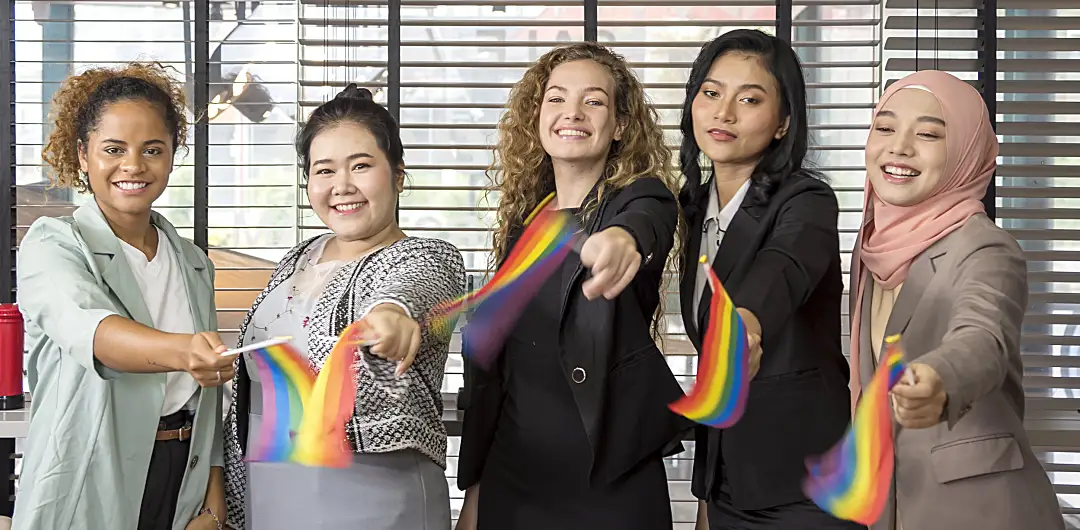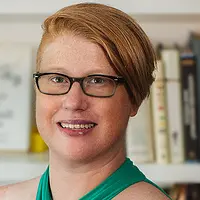
I am a cisgender, queer, white woman, and I use she/her pronouns. Growing up in a conservative, Christian family in North Carolina, I struggled to cope with the homophobia, sexism, and transphobia exhibited by the people around me. Using both subtle and overt messages, my family ingrained into me very specific expectations about appropriate sexual orientation and gender roles:
“I would be disappointed if you had a crush on a girl.”
“Girls can do anything boys can, but you would be so pretty if you’d wear your hair long… wear a dress and some jewelry… put on some makeup.”
It was clear that exploring beyond what others thought was “normal” shouldn’t happen, or at least, that such exploration had to be kept secret. So, they got what they wanted: although I did not stop being attracted to girls or being interested in less feminine dress and hairstyles, I did stop talking about it. At least for a while.
In my 20s, I came out as lesbian, and in my late 30s, I started identifying as queer. Years later, I began to truly explore and learn what it means to live outside of the male-female gender binary imposed by my culture.
In my first week at RTI, about 5 years ago, I immediately sought out the queer community. Growing more confident in my identity and more willing to be open both at home and at work, I was seeking that sense of belonging I craved. A few months later, RTI launched its Employee Resource Group (ERG) Program, and I had the opportunity to co-found the RTI Pride: LGBTQ+ ERG. Within the Pride ERG, I felt connected to my co-workers, psychologically safe, and free to be my authentic self. However, internalized sexism and cis-genderism still affected how I showed up at work and even in the safer space provided by the Pride ERG. Pestering thoughts lingered about needing to have long hair, wear makeup, and dress in traditionally feminine clothing to be considered professional.
Last year, I finally cut my hair and stopped wearing makeup. It took me 38 years to get the courage to do that. I love my hair now and I feel more like my authentic self. Most days, I think to myself, “Wow, here I am at work, short-haired, makeup-less, proudly queer, wearing my favorite, colorful (yet notably feminine) work shirts and accepted for who I am!” Still, in certain meetings, I worry what people are thinking. I wonder, “Will they take me seriously? Will they listen to my ideas? Am I professional enough?” I also think about the future and whether I might be judged more harshly in-person, when colleagues can see more than just my face on a screen.
If I am having these thoughts, how many others at RTI feel similarly for not fitting within the status quo?
A strong sense of belonging in the workplace has been shown to increase job performance by 56 percent, decrease turnover risk by 50 percent, and reduce sick days by 75 percent (HBR, The Value of Belonging). As I recently wrote in my journal, belonging is when I can say with confidence, “I feel good about myself. I feel like I can be exactly who I am, and I know that I am accepted.”
Getting to that feeling often starts with a supportive community. While I know RTI—like so many workplaces—still has a way to go, there have been some encouraging shifts within our ERGs. This past year, in the span of two Pride ERG’s connection circles—a place where LGBTQ+ identified folx come together in a safe space to share stories, get support and feel connected—I watched a beautiful thing unfold. At the beginning of the first connection circle, one Pride member changed their pronouns in Zoom from “she/her” to “she/they.” By the second connection circle, that same person changed their pronouns to “they/them.” Through the act of feeling seen and connecting with a group who affirmed them for who they are, they felt more comfortable being visible about their identity. Witnessing this shift confirmed how important it is to support a sense of belonging among co-workers.
I also felt comfortable being myself in that space. It felt warm and fuzzy inside my chest to get to share my experiences of being queer in this Zoom “room” full of people who I knew would accept me for who I am and what I experience. I felt lighter after that session. Connected. That is the kind of safe space we want to create for all employees.
Anyone can be an ally and foster a culture of belonging at work. One way to get started is by sharing your pronouns at the beginning of a meeting. Hearing your allyship might make someone feel more comfortable about sharing their own pronouns. You can also invest in learning more about queer identities, gender expression, and best practices for including people from the LGBTQ+ community by accessing reputable sources online, such as the website of the LGBTQ+ center in your community.
How do you foster a sense of belonging in your workplace? How about in your community? Even in your home?
